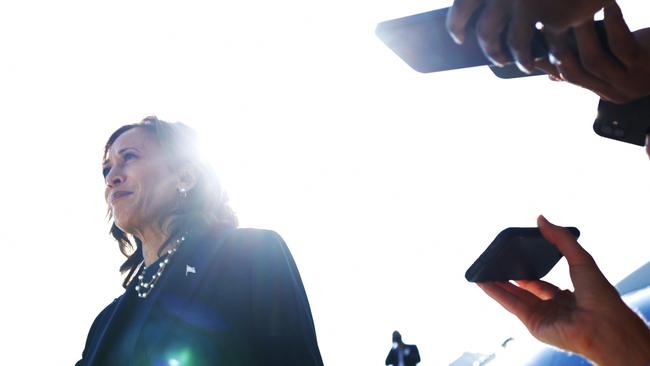Republicans rail against media’s ‘pro-Harris bias’
After almost three weeks of ignoring them, Kamala Harris held her first informal gathering of reporters last week. It lasted 70 seconds.

After almost three weeks of ignoring them, Kamala Harris held her first informal gathering of reporters outside Detroit Metropolitan airport in Michigan last week. For all of 70 seconds she answered questions.
Asked if she might consider talking a bit more to journalists covering her presidential campaign, she said she wanted “to get an interview scheduled before the end of the month”. Aides ushered her away.
It might be expected, then, that the presumptive Democratic nominee, who has previously faced a largely critical media in her role as Vice-President, including from supposedly left-leaning titles like The New York Times, could face a growing backlash in the press for her refusal to talk.
There is little sign of that. Time magazine, for example, declared this week that this was Ms Harris’s “moment” after she pulled off the “swiftest vibe shift in modern political history” with her campaign after President Joe Biden announced he would not run again.
As Ms Harris enjoys a surge in the polls, the magazine reflected on the excitement surrounding the announcement of her running-mate, the Minnesota Governor, Tim Walz. It wrote that the Harris campaign “resembled the early days of Barack Obama”.
Even Donald Trump was impressed by the coverage, telling Elon Musk in an interview that the Time cover made Ms Harris “look very much like our great first lady, Melania”.
His supporters, however, suggested the profile was an example of a growing media bias in favour of the Democrat. “The way the US corporate media transformed Kamala Harris from a national embarrassment to a transformative pioneer over night – without even pretending to care about anything that she thinks or believes – is a powerful testament to how potent the science of propaganda is,” wrote the journalist Glenn Greenwald, a frequent critic of the US media.
Allegations of bias against Mr Trump have also flared over the coverage of two announcements by the White House rivals in recent days. At a rally in Las Vegas on Saturday, Ms Harris promised to eliminate tax on tips for service workers if she wins in November.
Her announcement came two months after Mr Trump unveiled the same policy, also in Las Vegas, which has a huge hospitality industry. Mr Trump has accused his rival of stealing his populist idea, while his campaign dubbed Ms Harris “Copycat Kamala”.
“This was a TRUMP idea – she has no ideas, she can only steal from me,” the former president posted on his Truth Social platform. The media coverage of the two announcements further riled Mr Trump’s allies.
Tim Murtaugh, a communications director on Mr Trump’s 2020 campaign, highlighted two tweets by CBS News responding to the “tax on tips” policies. Reacting to Ms Harris’s announcement, CBS News tweeted that the Vice-President was “rolling out a new policy position, saying she’ll fight to end taxes on tips for service and hospitality workers”.
When Mr Trump unveiled the same policy in June, CBS tweeted that it “would cost the federal government up to $US250bn over 10 years”.
“Only sharp-eyed readers will be able to spot the difference in the coverage of the two proposals,” Mr Murtaugh said, framing the two CBS posts side by side. CBS did not immediately respond to a request for comment.
Mr Murtaugh’s post went viral, with thousands of Trump supporters accusing the network of bias and posting their own examples of alleged partisanship by the mainstream media.
The hostility between Trump supporters and sections of the American press is nothing new. Throughout his 2016 election campaign Mr Trump regularly criticised his press coverage, which he dubbed “fake news”. Once in the White House, he launched a full-scale crusade against the press. In February 2017, six weeks after his inauguration, he called the media “the enemy of the American people”.
Allegations of bias returned after Mr Trump announced his third White House campaign, resuming his attacks on journalists to rile up his supporters. Media outlets like The New York Times and CNN are routinely accused of bias by armies of Republican and Democratic supporters on social media. Democrats have complained that they face co-ordinated opposition from the conservative press.
Mr Biden’s increasing frailty and eventual decision to quit the presidential race also prompted Republican claims of a cover-up by the left-wing media. “It’s not just that they knew about Biden’s condition and lied about it. They knew they were lying and believed they could dupe their supporters at least through November 5, 2024 [polling day],” the journalist Bari Weiss wrote last month.
THE TIMES



To join the conversation, please log in. Don't have an account? Register
Join the conversation, you are commenting as Logout